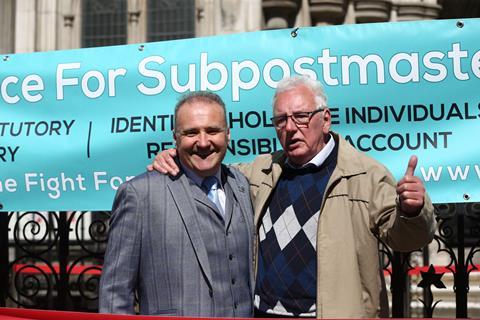An inquiry into what is arguably the most widespread miscarriage of justice in British history is about to turn its spotlight on the role of lawyers. The potential ethical ramifications are profound
A lawyer working in any large organisation will always have largely unresolvable tensions built into their role.
Both general counsel (GCs) and external lawyers instructed by large firms have to carefully weigh their independence as solicitors with their obligations to the client.
The Post Office Horizon IT Inquiry will consider whether GCs and external lawyers managed to strike the right balance while the most widespread miscarriage of justice in British legal history was developing around them.
The subject matter of the inquiry touches upon a once-in-a-generation travesty. However when the role of senior lawyers is scrutinised – which lead counsel have made clear will happen in the next few months – the issues which may come to light could be all too familiar.
‘The Post Office case is unique because you see so many problems manifesting, across so much time and across so many different lawyers in and outside of the Post Office team,’ Richard Moorhead, professor of law and professional ethics at the University of Exeter, told the Gazette.
‘Also, the consequences – because people have gone to prison, been bankrupted and killed themselves – make this case uniquely serious. But if you start to look at the wider problems both with in-house lawyers and private practitioners instructed, and the way they behaved, we see very much the kind of problems you see in lots of other cases.’
Moorhead has begun a three-year study funded by the Economic and Social Research Council into the Post Office scandal and the role the legal profession may have played in it.
Between 1991 and 2015, there were 918 prosecutions of postmasters accused of stealing from the Post Office arising from its faulty Horizon IT system. Multiple legal professionals, both in-house and external, are under scrutiny for their roles in the handling of allegations leading to the criminal convictions, in subsequent appeals, with regard to mediation and over whether misleading statements were made about the contents of reports into the reliability of Horizon.
In fact, some lawyers have come under fire already.
Lee Castleton, one of the postmasters bankrupted, has alleged in a counterclaim against the Post Office that he was contacted by the Post Office’s solicitor, Stephen Dilley, who he claims warned ‘we will ruin you’. Dilley is now head of the commercial litigation team in Bristol at national firm Womble Bond Dickinson. A WBD spokesperson told the Gazette: ‘We strongly reject this accusation. While the inquiry is under way it would be inappropriate to comment further.’
The senior prosecutor at the Post Office, meanwhile, Jarnail Singh, was responsible for preparing evidence against sub-postmasters. He has denied any wrongdoing and insists he did not know of problems with Horizon. And Chris Aujard, former general counsel (interim) at Post Office, was involved in a mediation scheme which has been accused of frustrating the efforts of victims to obtain answers and justice.
'The [reporting] lines between in-house lawyers and their organisations [are blurred]. Do they report to the CEO or to somebody more junior? Do they have reporting lines to the chair or senior independent director of the board?'
Professor Richard Moorhead, University of Exeter
While individuals will inevitably be questioned over their personal conduct, Moorhead is interested in what the case reveals about the problems facing the profession more widely. He said: ‘It speaks to problems about how lawyers react when instructed to help with legal problems with powerful individuals or organisations, especially in crisis or high-pressure situations.’
An issue identified by Moorhead is lawyers understanding who their client is. ‘Their client is the organisation, not the individual executive,’ he stressed.
The way independent investigations are conducted and written, and the reporting lines of management, are further areas of concern. ‘The [reporting] lines between in-house lawyers and their organisations [are blurred],’ Moorhead explained. ‘Do they report to the CEO or to somebody more junior? Do they have reporting lines to the chair or senior independent director of the board?’
Lawyers and their clients having a shared understanding that a lawyer’s independence is important and respected within the organisation is significant, Moorhead added. But he stressed that external lawyers also need to be scrutinised, because as many as six law firms may have advised the Post Office on private prosecutions.
When, how and in what ways private practitioners are instructed in moments of crisis are key elements of Moorhead’s research. ‘How they see their role, what they are told and how they behave can be really important too,’ he added.
Moorhead believes the kinds of pressures on lawyers in the Post Office case appear to be the same as those highlighted in a letter, signed by over 30 GCs and shared online in March, responding to an in-house solicitors thematic review by the Solicitors Regulation Authority.

SRA chief executive Paul Philip said in the review: ‘The findings are generally encouraging – most in-house solicitors appear to be able to serve their employers well while still upholding the high standards expected of them. Yet a minority struggle. We heard frequently that heavy workloads were a significant challenge. That is a problem if it means some in-house solicitors struggle to commit appropriate time to training or careful consideration of key decisions.’
The GCs’ letter claimed the conclusions of the SRA review understated the severity of the risks present in the in-house environment and misinterpreted their cause.
One of the letter’s signatories, Jenifer Swallow, a highly experienced GC, was the co-author of a paper published in April last year: The Post Office Scandal: in-house lawyer regulation and practice in the spotlight.
She told the Gazette: ‘The system within which an individual operates is as relevant as the individual themselves.’
There can be a ‘silence’ regarding the regulatory responsibilities of GCs within their employment terms, Swallow said. The SRA’s in-house legal review found that 64% of GCs do not raise the topic of their independence with their employer clients.
‘Nobody really thinks about an engagement letter, which you would always have in private practice, in the in-house context,’ Swallow added. ‘This alone is not a “smoking gun”, but it is an indicator of a lack of discourse between the legal function and the board and/or the hiring manager.’
Swallow had been considering how systems, infrastructure and working environments could be adapted to make it ‘very unlikely for calamities such as the Post Office case to [recur].
‘What was instituted within the contracts of those lawyers at the Post Office? Was the situation clear from the outset that that person had regulatory responsibilities and were those duties regularly drawn attention to?,’ she asks.
Swallow pointed to the local authority context, where there is a statutory monitoring officer. The lawyer is given, under legislation, a particular role with specific reporting obligations, in contrast with GCs who may not have a direct reporting line into the board.
The structure of an organisation is important for Swallow because the tension between client interests and the public interest can become ‘so great that you cannot rely only on the voice of in-house counsel.
‘My experience is that it is very hard when you are one person speaking against the voice of many within a client environment,’ Swallow said. ‘Many lawyers in that situation will simply resign. I would like to see a situation where that is not the case. But there are many examples, and I have experienced it myself, where you actually just have to choose to leave the organisation.
‘If there are things which are fundamental to the public interest and things that are implicated in your duties, it would be very difficult to stay in those circumstances.’
'There has been an enormous miscarriage of justice and people want answers. It would be very difficult to look at that in a way that felt fair to those people without including the advisers of the decision-makers'
Jenifer Swallow
Swallow pointed to a lack of resources to train juniors on ethics. She claimed many GCs feel very disconnected from the SRA and the Law Society. The word ‘irrelevant’ was regularly used by GCs, Swallow said.
‘When I was in a conflict situation and needing support, I called the SRA and there was no support. The SRA’s helpline was “oh yes, it is very difficult”.
‘We are in a situation where there has been an enormous miscarriage of justice and people want answers. It would be very difficult to look at that in a way that felt fair to those people without including the advisers of the decision-makers,’ Swallow said.
‘This is why we are encouraging the SRA and others to be proactive, such that we do not go through cycles of corporate calamity as a mechanism of looking at governance needs and how we can strengthen in this area.’
Moorhead agrees, stating that while changes could be brought about by regulation, some issues could be addressed by better guidance on good practice. ‘The critical point is that there is a shared responsibility,’ Moorhead said. ‘Practitioners have to take some share of responsibility for these kinds of problems and their clients, and so do the regulators.
‘Both the Law Society and the SRA have too often stood back from professional ethical challenges, particularly in-house and commercial solicitors. They should be trying vigorously to help bolster the independence of thinking and behaviours of commercial lawyers, both in-house and private practice.’
It is notable that Society president Lubna Shuja has made professional ethics a key focus of her incumbency, ‘to support solicitors though this minefield’.
She told the Gazette: ‘At the Law Society we are constantly looking for ways we can better support the profession to adhere to high ethical standards. This is why I started a three-year ethics programme to help the profession navigate the particularly complex and changing landscape in which legal services are provided. As part of this programme, we have already begun a discussion with in-house solicitors as to how we can better support them to uphold their ethical obligations.
‘We are shocked and saddened by the terrible impact the Post Office scandal had on so many people’s lives and are following the inquiry very closely. Hearing and evaluating the evidence of the lawyers involved will help us to incorporate lessons learned into the outputs of our ethics programme, particularly for the in-house community.’
The SRA, meanwhile, has been identified as a core participant in the Post Office Inquiry, with access to relevant files and documents ahead of the next phase of live evidence beginning in June, when the role of legal advisers will become a principal focus.
Regulators have said they will closely monitor the outcomes of the inquiry, but Swallow suggested the focus for the retired High Court judge leading the inquiry, Sir Wyn Williams, could be getting the appropriate payouts for undercompensated victims.
‘Of course, there needs to be a prioritisation,’ Swallow said. ‘Whatever happens in relation to the inquiry, that should not be the end of the matter.
‘What would be a failure on behalf of the profession – and on behalf of boards of directors – is that we look at this as “there were some bad people over there who did some bad things”.
‘We should look at how that happened and what we could do collectively to ensure those situations are avoided.’
This article is now closed for comment.




































8 Readers' comments